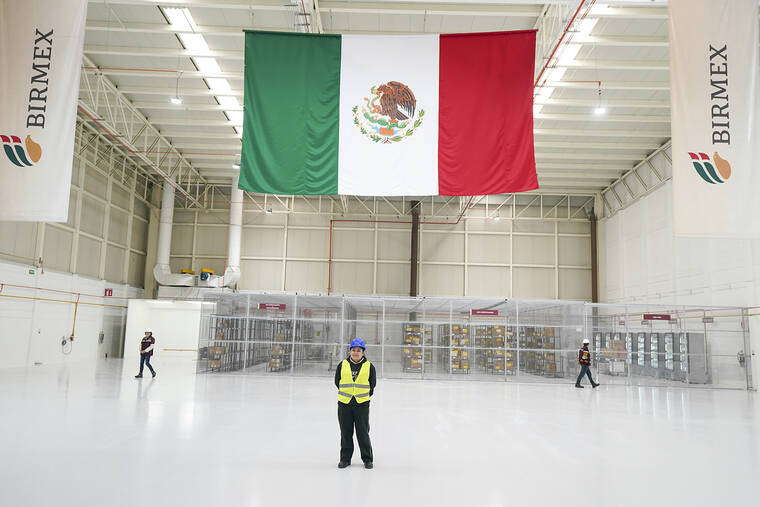Mexican president inaugurates centralized ‘super pharmacy’ to supply medicines to all of Mexico
MEXICO CITY — Mexico’s president inaugurated a huge “super pharmacy” Friday in a bid to end the woes of patients throughout the country who are often told they need a specific medicine — but the hospital in question doesn’t have it.
President Andrés Manuel López Obrador’s solution was to outfit a big warehouse on the outskirts of Mexico City to centralize a supply and send it to hospitals throughout the country.
ADVERTISING
“The pharmacy is going to be big, big, big, and it is going to have all the medications that are used in the heath system,” López Obrador said Friday.
The pharmacy is intended to complement local health facilities.
If a patient can’t get needed medications at a local hospital, the patient, the patient’s doctor or the pharmacist would be able to call up the warehouse and get it delivered from the huge 40,000 square meter (430,000 square foot) Mexico City warehouse.
The armed forces, or the government-run pharmaceutical company Birmex, will ship the drugs out by land or air “within 24 to 48 hours,” López Obrador pledged.
The question is whether Mexico can overcome its history of being bad at regulating the pharmaceutical industry, bad at buying medicines, bad at storing them, and bad at distributing them. Extreme centralization also hasn’t helped Mexico much in the past in many areas.
The most visible face of this problem are the parents of children with cancer, who frequently stage protests because they say that in recent years chemotherapy and other drugs have been impossible to obtain.
Desperate parents blocked traffic at the Mexico City airport last year, holding up a banner reading: “There isn’t any chemotherapy, treatment or medicines, have some empathy and sensitivity.”
The problems have killed otherwise healthy people. Because Mexico has had problems in obtaining enough morphine, anesthesiologists in Mexico have had to carry around their own vials of the sedative, drawing multiple doses out of a single vial for routine procedures like spinal blocks during births.
In the United States, where there is no shortage of morphine, doctors are advised to draw a single dose from a vial and throw the remainder out.
But in Mexico, that has led to contamination of the vials, triggering outbreaks of injection-induced meningitis in two Mexican states that have killed dozens of people — including some Americans who sought treatment at clinics in the border city of Matamoros, across from Brownsville, Texas.
López Obrador mounted a major effort to obtain COVID-19 vaccines in 2021, using the armed forces to distribute them and volunteers to help apply them, and by the end of that year just about anybody in Mexico who wanted a vaccine got one, for free.
But trying to replicate that model of centralized government purchasing and army distribution on a national scale for thousands of medications is not the same, according to Mauricio Rodríguez, a professor at the School of Medicine at Mexico’s National Autonomous University.
“This is crazy,” said Rodríguez, noting the government is opening the centralized warehouse without answering how the system will operate, especially for urgently-needed medications. He noted that concentrating all the drugs at one site increases risks, and could sideline some already-existing distribution systems.
Many of the problems pre-date López Obrador, who took office in late 2018. For decades, there have been scandals involving of millions of dollars worth of medicines going out-of-date at warehouses while hospitals couldn’t get them.
The country’s medicine regulatory agency, known by its Spanish acronym as Cofepris, was already so riddled with corruption prior to López Obrador that regulators would hide applications for approval of new medicines for years, and demand bribes to approve them.


